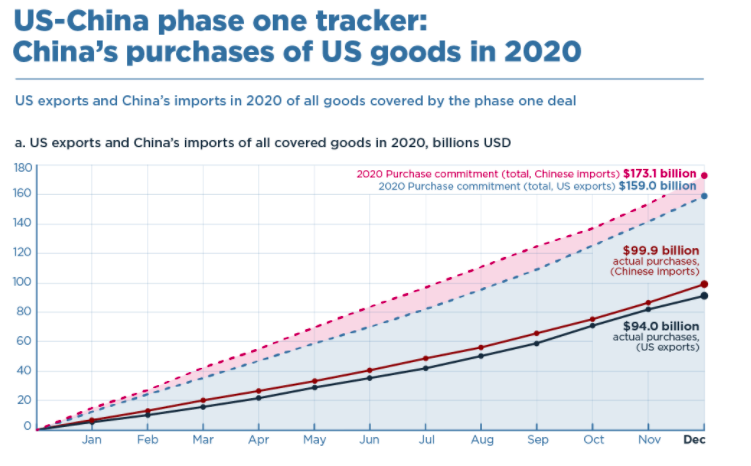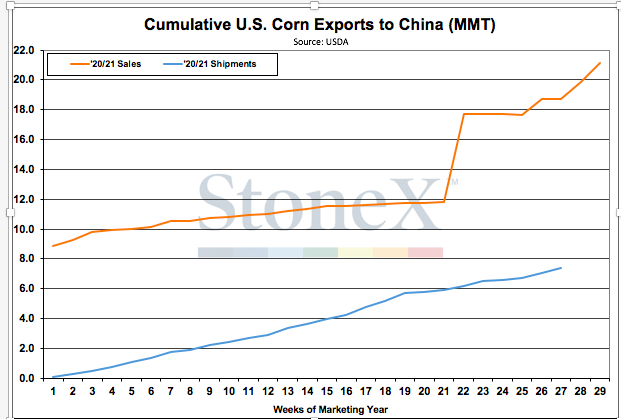Here’s What Agriculture Wants Out of U.S., China March Meeting
Brian Kuehl China/U.S. Meeting
As the U.S. and China enter into the second year of the Phase One trade deal, the U.S. and China are meeting for the first time since President Biden took office. U.S. Secretary of State Antony Blinken and the National Security Advisor Jake Sullivan are in Alaska to meet with two senior Chinese diplomats.
Mixed messages have circulated about the goals of this meeting. However, leading into the meeting, China announced several sales of U.S. old-crop corn, which racked up to a total of 121 million bushels this week.
Brian Kuehl, executive director for Farmers for Free Trade, says buys or not, a reset between the two countries is needed.
“This is a reset for the U.S.-China relationship, and the Biden team has made it clear what they want to do is look holistically at the relationship with China,” Kuehl says. “I think that's a fair thing for them to do. They are stepping into a new realm. They want to take a look at everything that was done under the Trump administration, and they want to chart their path forward. They don't want to act precipitously. So, this seems like a smart approach.”
Kuehl says from an agricultural standpoint, Farmers for Free Trade wants to see a full implementation of the Phase One trade agreement. A year into the deal, there are still accountability and compliance issues with China.
“We've got another year to run on the Phase One deal, and ultimately, we'd like to see the tariffs removed,” he adds. “We'd like to see the relationship with China evolve to the point where we can back off some of these tariffs that are still serving as a drag on our economy.”
Kuehl says the Phase One agreement had two main components, one of which is to address non-tariff barriers to trade.
“I think there were 57 barriers we identified, and I think they've done well on maybe 50 of them. So, there's a handful, specifically, some of the biotech that needs to be met still need work,” he says.

While Kuehl thinks China has done a decent job in addressing the majority of the non-tariff barriers brought up during the Phase One talks, the other piece of the trade pact dealt with actual purchasing commitments.
“There again, I think they've done a pretty good job,” he adds. “I'd give them a B+. They didn't hit the targets, but I think they made a good faith effort. And it is a two-year deal.”
Kuehl says it’s fair to ask if China is buying based on its Phase One commitments or because it needs the commodities. At this point, he says it doesn’t matter the reason; China buying is a good sign.
Arlan Suderman of StoneX Group thinks China is buying because the country needs the goods in order to rebuild reserves. He says China is looking at a $2 profit to buy U.S. corn, ship it and put it in their own reserves to resell at auction. Suderman also says the Tariff Rate Quotas (TRQs) are a sign China isn’t interested in living up to its Phase One promises.
“I’ve lost confidence that Phase One turned into anything more than buying what they needed anyway,” he says. “One of the primary factors we were proud of in Phase One was negotiating more transparency in their TRQ program, and they've become less transparent. They're not issuing public import permits for this corn. They're just doing it behind the scenes, so to speak, and their state green buying agency is moving in without any apparent TRQs to do so.”

While Suderman wants to see signs of a positive relationship between the U.S. and China talks this week, he thinks China will continue to buy if it needs the products.
“Both sides have been trying to keep ag segmented out of the other issues. And as long as the relationships do not totally fall apart, that will likely continue to be the case,” says Suderman.
Too Early for Phase Two
While there is still talk about whether China will honor Phase One of the agreement between the two countries, it may be too early to talk abut a possible Phase Two.
“I'd kind of like to see talks focus on Phase 1.2 or Phase 1.3,” says Kuehl. “The notion of Phase Two was we're going to address all the economic restructuring of China, how to make sure that they move from being a state economy into a free market economy. Those are really big, fundamental questions for China, and I think there's a lot of skepticism about can we get to Phase Two.”
This week, U.S. Trade Representative Katherine Tai officially took the role as Biden’s top trade negotiator after she was sworn in Thursday. Kuehl thinks Tai will be a strong force in holding China accountable in the years ahead.
Related Stories:
Politics or Real Demand: What's Driving China's Big Corn Buys This Week?







